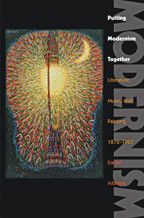
Reviews
The often-vexed societal reception of modernism and opera is foreboding testimony to the necessity for this book, which is the first collection of its kind... Essential.
Modernism and Opera suggests that the lessons of early modernism have been available to those who would listen. The collection draws not only on ‘New Modernist Studies,’ but also on the older ‘New Musicology.’
A monumental undertaking that has been assembled with exquisite care. This collection coheres beautifully and reveals new aspects of the connection between opera and modernism. Utterly stimulating.
Opera – the endlessly "dying" form – and modernism – the endlessly emerging shape of things to come: Richard Begam and Matthew Wilson Smith bring us up to date with rich and ambitious readings of works from Wagner to Saariaho, demonstrating that if modernism is a storm, opera may be its ear.
Modernism and Opera is a book that had to be written. Its brilliant chapters about music-theater works from Wagner to Saariaho illuminate how opera’s extravagance, theatricality, and intermediality are the often overlooked foundations and companions to our received ideas about Modernist art, collaboration, and style.
This is a fantastic volume, brimming with nuanced reformulations of operatic modernisms. The quality of the essays never wavers. A must-read for those interested not only in the links between modernism and music but also in the very notion of interdisciplinarity, which here is given a new lease of life.
Book Details
Acknowledgments
Richard Begam and Matthew Wilson Smith
Introduction
Part One
World War I and Before: Crises of Gender and Theatricality
1. Matthew Wilson Smith
"Laughing at the Redeemer: Kundry and the
Acknowledgments
Richard Begam and Matthew Wilson Smith
Introduction
Part One
World War I and Before: Crises of Gender and Theatricality
1. Matthew Wilson Smith
"Laughing at the Redeemer: Kundry and the Paradox of Parsifal"
2. Daniel Albright
"Materlinck, Debussy and Modernism"
3. Klára Móricz
"Echoes of the Self: Cosmic Loneliness in Bartók's Duke Bluebeard's Castle"
Part Two
Interwar Modernism: Movement and Countermovement
4. Bryan Gilliam
"The Great War and Its Aftermath: Strauss
and Hofmannthal's 'Third-Way Modernism'"
5. Bernadette Meyler
"Adorno's Shifting Wozzeck"
6. Derek Katz
"Many Modernisms, Two Makropulos Cases:
Čapek, Janáček and the Shifting Avant-Gardes of Inter-war Prague"
7. Richard Begam
"Schoenberg, Modernism and Degeneracy"
8. Cyrena Pondrom
"Gertrude Stein, Minimalism and Modern Opera"
Part Three
Opera after World War II: Tensions of Institutional Modernism
9. Herbert S. Lindenberger,
"Stravinsky, Auden and the Mid-Century Modernism of The Rake's Progress"
10. Irene Morra
"Gloriana and the New Elizabethan Age"
11. Linda and Michael Hutcheon
"One Saint in Eight Tableaux: The Untimely Modernism
of Olivier Messiaen's Saint François d'Assise"
12. Joy H. Calico
"Saariaho's L'amour de loin: Modernist Opera in the Twenty-First Century"
Notes on Contributors
Index





